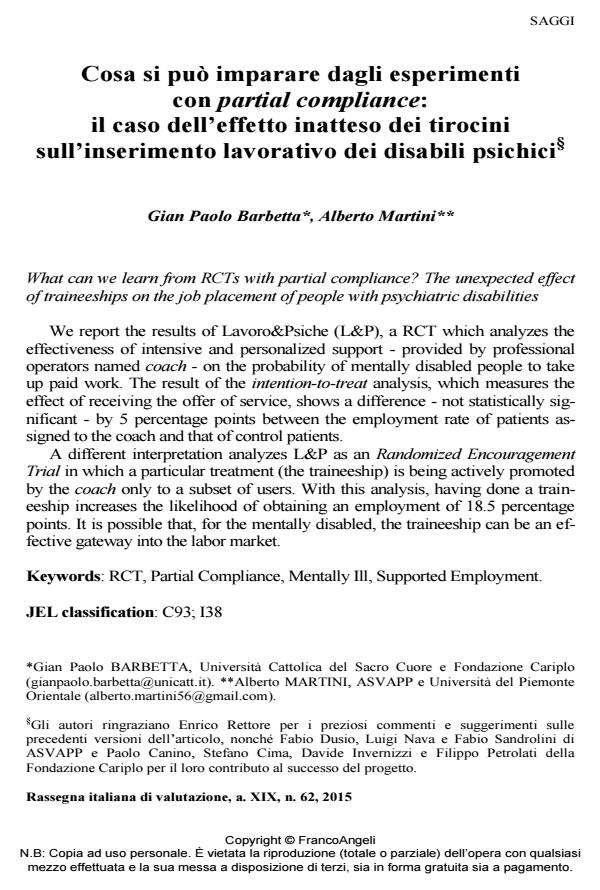Cosa si può imparare dagli esperimenti con partial compliance: il caso dell’effetto inatteso dei tirocini sull’inserimento lavorativo dei disabili psichici
Titolo Rivista RIV Rassegna Italiana di Valutazione
Autori/Curatori Gian Paolo Barbetta, Alberto Martini
Anno di pubblicazione 2016 Fascicolo 2015/62 Lingua Italiano
Numero pagine 15 P. 30-44 Dimensione file 622 KB
DOI 10.3280/RIV2015-062004
Il DOI è il codice a barre della proprietà intellettuale: per saperne di più
clicca qui
Qui sotto puoi vedere in anteprima la prima pagina di questo articolo.
Se questo articolo ti interessa, lo puoi acquistare (e scaricare in formato pdf) seguendo le facili indicazioni per acquistare il download credit. Acquista Download Credits per scaricare questo Articolo in formato PDF

FrancoAngeli è membro della Publishers International Linking Association, Inc (PILA)associazione indipendente e non profit per facilitare (attraverso i servizi tecnologici implementati da CrossRef.org) l’accesso degli studiosi ai contenuti digitali nelle pubblicazioni professionali e scientifiche
We report the results of Lavoro&Psiche (L&P), a RCT which analyzes the effectiveness of intensive and personalized support - provided by professional operators named coach - on the probability of mentally disabled people to take up paid work. The result of the intention-to-treat analysis, which measures the effect of receiving the offer of service, shows a difference - not statistically significant - by 5 percentage points between the employment rate of patients assigned to the coach and that of control patients. A different interpretation analyzes L&P as an Randomized Encouragement Trial in which a particular treatment (the traineeship) is being actively promoted by the coach only to a subset of users. With this analysis, having done a traineeship increases the likelihood of obtaining an employment of 18.5 percentage points. It is possible that, for the mentally disabled, the traineeship can be an effective gateway into the labor market.;
Keywords:RCT, Partial Compliance, Mentally Ill, Supported Employment.
Jel codes:C93; I38
- Arbesman M. and Logsdon D.W. (2011). Occupational therapy interventions for employment and education for adults with serious mental illness: a systematic review. American Journal of Occupational Therapy 65(3): 238-46.
- Angrist J., Imbens G. and Rubin D. (1996). Identification of Causal Effects Using Instrumental Variables. JASA Applications invited paper, Journal of the American Statistical Association 91(434): 444-55.
- Bilder S. and Mechanic D. (2003). Navigating the Disability Process: Persons with Mental Disorders Applying for and Receiving Disability Benefit. The Milbank Quarterly 81(1): 75–106.
- Black D., Joo J., LaLonde R., Smith J.A. and Taylor E.J. (2015). Simple Tests for Selection Bias: Learning More from Instrumental Variables. IZA DP 9346, September.
- Canino P., Barbetta G.P., Cima S. e Petrolati F. (2013). Lavoro e Psiche. Un progetto sperimentale per l’integrazione lavorativa di persone con gravi disturbi psichiatrici. Quaderni dell’Osservatorio, Fondazione Cariplo, 12 Crowther R.E., Marshall M., Bond G.R. and Huxley P. (2001). Helping people with severe mental illness to obtain work: systematic review. British Medical Journal 322: 204-8.
- The Economist (2014). The internship: Generation i. Sept 6th.
- Howard L.M., Heslin M., Leese M., McCrone P., Rice C., Jarrett M., Spokes T., Huxley P. and Thornicroft G. (2010). The British Journal of Psychiatry 196: 404-11.
- McGurk S.R., Mueser K.T. and Pascaris A. (2005). Cognitive training and supported employment for persons with severe mental illness. Schizophrenia Bulletin, 898-909.
- Murray M.P. (2006). Avoiding Invalid Instruments and Coping with Weak Instruments. Journal of Economic Perspectives, American Economic Association 20(4): 111-32.
- Twamley E.W., Veste D.V. and Lehman A.F. (2003). Vocational rehabilitation in schizophrenia and other psychotic disorders. A literature review and meta-analysis of randomized controlled trials. The Journal of Nervous and Mental Disease 191(8): 515-23.
- Unioncamere, Rapporto Excelsior (2012) su “Formazione continua e attivazione di stage” AAVV.
Gian Paolo Barbetta, Alberto Martini, Cosa si può imparare dagli esperimenti con partial compliance: il caso dell’effetto inatteso dei tirocini sull’inserimento lavorativo dei disabili psichici in "RIV Rassegna Italiana di Valutazione" 62/2015, pp 30-44, DOI: 10.3280/RIV2015-062004